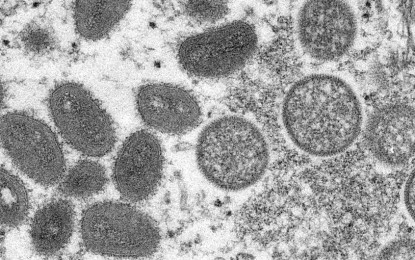
VIRUS. Monkeypox is a rare disease caused by infection of the monkeypox virus and usually occurs throughout Central and West Africa, often near tropical rain forests. As of May 20, 2022, the World Health Organization confirmed 80 cases across 11 countries. (Photo courtesy of UN)
MANILA – The Philippines continues to monitor the outbreak of monkeypox overseas but the closure of borders is still unlikely, the special adviser against the coronavirus disease 2019 (Covid-19) said Saturday.
In a “Laging Handa” briefing, National Task Force (NTF) Against Covid-19’s Dr. Ted Herbosa said monkeypox is an old disease that is not airborne and as infectious as Covid-19.
"We will monitor and prepare for it but the same minimum public health measures to prevent it would apply," he said in Filipino. "Ako (I), as an advisor, will not recommend closing our borders just because there are 85 reported cases of monkeypox."
Herbosa, an infectious diseases expert, said monkeypox is a relative of the already eradicated smallpox virus, which can be used to manufacture a vaccine.
"’Yung smallpox virus, maaring magawang bakuna at pupuwedeng epektibo dito sa monkeypox. So sa mga bansa na naka-freeze 'yung virus ng smallpox, they can actually manufacture the necessary vaccine although wala tayo commercially. Kapag kumalat, puwedeng gumawa ng bakuna (A vaccine against smallpox can serve as an alternative and may provide protection against monkeypox. Some countries were able to freeze the smallpox virus since eradication, so they can actually manufacture the vaccine if it spreads)," he said.
The World Health Organization (WHO) on May 20 confirmed 80 cases of monkeypox across 11 countries while investigating 50 others.
It warned that "more are likely to be reported" as surveillance expands.
As of May 19, over 10 countries where monkeypox is not endemic have detected the virus, the WHO said.
On Friday, the Netherlands and Paris confirmed their first monkeypox cases.
Dutch authorities have yet to provide details while the Paris Health Ministry said its case involves a 29-year-old man who had no previous record of traveling to a country where the virus is circulating, according to Anadolu News Agency.
Monkeypox symptoms typically include fever, intense headache, muscle aches, back pain, low energy, swollen lymph nodes and a skin rash or lesions.
The rash usually begins within one to three days after the onset of fever.
Lesions can be flat or slightly raised, filled with clear or yellowish fluid, and can then crust, dry up, and fall off, according to WHO.
The incubation of the disease can range from five to 21 days.
In another news release on Friday, the WHO said some cases were detected through sexual health services and are among men who have sex with men.
“Furthermore, it is suspected that transmission may have been ongoing for some time, as the cases are geographically dispersed across Europe and beyond,” the news release stated, emphasizing that those infected will recover within a few weeks without treatment but the disease can be more severe in young children, the pregnant, and immunocompromised. (PNA)
